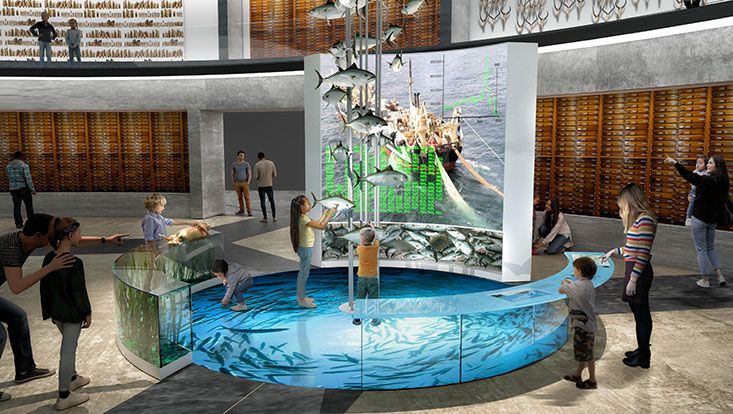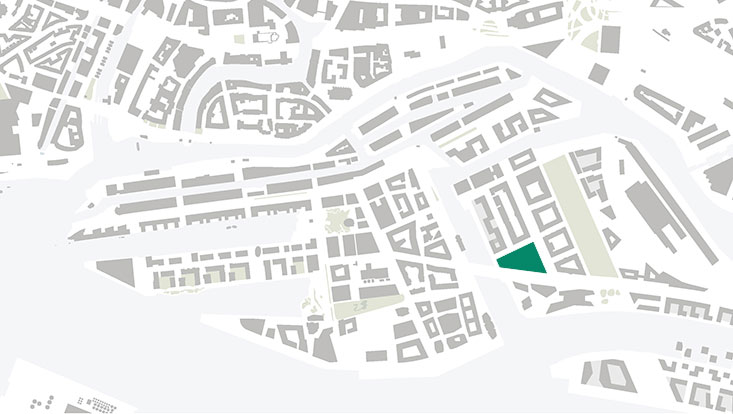Milestones
2023 - 2024
- The LIB is developing the rough concept for the future permanent exhibition of the new natural history museum. The scenographic concept for the Evolutioneum developed in 2020 with the renowned exhibition agency Ralph Appelbaum Associates (RAA) serves as the basis.
 Functional biodiversity © Ralph Appelbaum Associates, 2022 Foto Trawler Pierre Gleizes_Greenpeace
Functional biodiversity © Ralph Appelbaum Associates, 2022 Foto Trawler Pierre Gleizes_Greenpeace
- Furthermore, the so-called user groups within the LIB are developing concepts for the areas of research (laboratory infrastructure for the new building), collection (optimal collection accommodation for the 10 million Hamburg collection objects and the future accessibility of parts of the collection for the public), as well as knowledge transfer (education and communication, science literacy, citizen science) for the new building and the future of the LIB in Hamburg.
- Start of the preliminary project (feasibility study for the construction) with the Hamburg-based realisation company Sprinkenhof GmbH.
- The Evolutioneum project group is in dialogue with project teams from other new museum construction projects in Germany and abroad.
2022
- In November 2022, following a site potential analysis, the Senate Steering Group decided on construction site 51 in HafenCity as the location for the new Natural History Museum. This is located in Elbtorquartier between Überseeallee, Shanghaiallee and Hongkongstraße.
 © Winking Froh Architekten
© Winking Froh Architekten
- The Senate of the City of Hamburg is having various plots of land in Hamburg examined for their suitability as a location for the new Natural History Museum.
- The Hamburg Authority for Science, Research, Equality and Districts (BWFGB), has commissioned HIS-HE - an independent consultant for higher education planning and development - to calculate the space requirements for the new Natural History Museum.
2021
- On 1 July 2021, CeNak merged with the Zoological Research Museum Alexander Koenig (ZFMK) to form the newly founded Leibniz Institute for the Analysis of Biodiversity Change (LIB). This is to ensure the continued adequate accommodation and research of the valuable scientific collections and to pave the way for the establishment of a new natural history museum in Hamburg.
- On 9 March 2021, the Senate of the Free and Hanseatic City of Hamburg announced its approval of the funding and the state treaty between Hamburg and North Rhine-Westphalia. This means that the first political hurdle for the strategic further development into a joint Leibniz Institute for the Analysis of Biodiversity Change (LIB) and the establishment of a new natural history museum in Hamburg has been cleared. To the News>
2020
- On 26 June 2020, the Joint Science Conference of the Federal Government and the Länder (GWK) decided to include the Centre for Natural History (CeNak) in the Leibniz Association's funding. Together with the Bonn Zoological Research Museum Alexander Koenig (ZFMK) - Leibniz Institute for Animal Biodiversity (Museum Koenig) - it is to be merged into a new Leibniz Institute (LIB) with two locations. The start is planned for the beginning of 2021. To the News >
- In the Hamburg coalition negotiations on 8 May 2020, the SPD and the Greens explicitly advocate the establishment of a modern natural history museum in which the collections are to be adequately housed and corresponding modern exhibition spaces created. Senator Katharina Fegebank: "We have made a clear commitment that we want to create a modern natural history museum." To the News >
- Written minor question in the Hamburg Parliament by Anna-Elisabeth von Treuenfels-Frowein (independent, FDP, 5.11.2020): Zusammenführung des Hamburger CeNak mit dem Bonner ZFMK zu einem neuen Institut für die Analyse des Biodiversitätswandels (LIB) in der Leibniz-Gemeinschaft (LG)
- Written minor question in the Hamburg Parliament by Dr Anke Frieling (CDU, 8.7.2020): Wie weit sind die Planungen für ein neues Naturkundemuseum für Hamburg vorangeschritten?
- The Berlin office of the internationally renowned exhibition firm Ralph Appelbaum Associates (RAA) is working with CeNak to develop the scenographic concept for a new natural history museum in Hamburg called "Evolutioneum". Ralph Appelbaum Associates are known as planners and designers of award-winning museums, exhibitions and visitor centres worldwide. (www.raai.com).
2019
- Start of the admission process of CeNak to the renowned Leibniz Association with inspections by a commission of the Senate of the Leibniz Association (March 2019) and the Science Council (June 2019). The LIB, a Leibniz Institute for the Analysis of Biodiversity Change, which is to be established together with the Zoological Research Museum Alexander Koenig (ZFMK) in Bonn, was applied for.
 © Draft of the HCU Master's graduates Marc Depenbrock and Lennart Riesenbeck (2018)
© Draft of the HCU Master's graduates Marc Depenbrock and Lennart Riesenbeck (2018)
2018
- Together with the responsible ministry of the state of North Rhine-Westphalia, the Hamburg Senate submitted an application at the beginning of September to admit CeNak to the renowned Leibniz Association. The Zoological Research Museum Alexander Koenig (ZFMK) in Bonn is applying, together with CeNak, to establish a new Leibniz Institute for the Analysis of Biodiversity Change (LIB). To the News >
- Written minor question in the Hamburg Parliament by Daniel Oetzel (FDP, 21.9.2018): Bewerbung um ein Leibniz-Institut - Was ist der aktuelle Stand?
2017
- With the establishment of a Stiftung Naturkunde Hamburg, under the umbrella of the University of Hamburg as trustee, an operational basis for a new natural history museum in the Hanseatic city was laid in November 2017. The founders of the trust foundation are the Society of Friends and Patrons of the Hamburg Zoological Museum and the Natural History Society in Hamburg. The statutory objective of the foundation is - in addition to promoting the development, expansion and maintenance of places of natural history research and education - in particular the construction and operation of a new natural history museum in the Hanseatic city. Flyer Stiftung Naturkunde Hamburg [PDF]
- Opening of a newly designed museum foyer: With the newly designed entrance area completed in April 2017 on the Bundesstraße, the Zoological Museum is opening up to the city in a first step. In the new foyer, CeNak takes a first look at the future of an "evolutioneum". The topics touched on here relating to the Anthropocene illuminate the key role of humans as the greatest force of nature and an important factor in evolution. The exhibition concept for an "Evolutioneum" also focuses on the evolution of everything that exists: from the Big Bang and the development of the universe and life to the driving role of humans in changing the environment.
- The structural preliminary work for a comprehensive innovative exhibition concept is being intensified with the involvement of various urban and civic initiatives. Preliminary studies are being conducted together with the University of Hamburg to further develop content as well as urban planning and architectural considerations.
2016
- CeNak submits a financing concept to the City of Hamburg for a new building in a prominent location such as the HafenCity and for the running costs of a natural history museum.
2015
- On the initiative of the University of Hamburg, the aac Academy for Architectural Culture is dealing with designs for an "Evolutioneum" as a natural history museum of the 21st century in its autumn workshop 2015. Designs are to be created that deal decisively with the character of two possible locations. The great challenge is to bring together the areas of exhibition, research and collection, to support interaction, to create transparency and to allow the public access, insight and sensory experience. For the "Vision Evolutioneum", the studies are to formulate an adequate architectural expression that will be useful for the further, real implementation. The results of the workshop have been on display in the permanent exhibition of the Zoological Museum Hamburg since April 2017.
2014
- Foundation of the Centre for Natural History (CeNak). Merging of the research fields of zoology, mineralogy and palaeontology-geology under one management. Prof. Dr. Matthias Glaubrecht becomes founding director of the CeNak, which as a central operating unit reports directly to the Presidium of the University of Hamburg. Expansion of the research infrastructure in the field of international biodiversity and evolution research and staffing of important key positions. Restructuring and expansion of the scientific collections.
2008
- The report of the Science Council reveals the desolate situation of Hamburg's three natural science museums (Zoological Museum, Mineralogical Museum, Geological-Palaeontological Museum) to the responsible science authority of the City of Hamburg. The condition of the buildings in need of renovation is clearly pointed out. The Science Council also emphasises the great importance of the scientific collections and the urgency of adequately housing and preserving them.


















